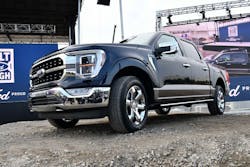Is Your Business 'Shock-Proof?' Four Things to Keep in Mind as Vehicles Electrify
In the November 2020 issue of MTD, in this very column, I wrote that “electric vehicles (EV) are here to stay.” Boy, was that an understatement! Since then, both the public and private sector have doubled down on vehicle electrification. This has the potential to impact your business in profound ways.
Let’s take a look at what has been announced so far.
President Joe Biden’s $2.3 trillion American Jobs Plan has earmarked $174 billion for investment in electric vehicles. This amount represents nearly 30% of the total number of dollars that the administration has set aside for transportation infrastructure improvements.
According to the White House, the investment “will enable automakers to spur domestic supply chains from raw materials to parts, retool factories to compete globally” in electric vehicle production “and support American workers to make batteries and EVs.” It will provide consumers with rebates and tax incentives to buy electric cars. And it will create grant and incentive programs “to build a national network of 500,000 EV chargers by 2030.”
Will the American Jobs Plan unfold as envisioned? That remains to be seen. Either way, expect vehicle electrification to remain a high government priority.
What’s happening on the vehicle manufacturers’ side?
In January, General Motors (GM) revealed that it will invest $27 billion in the development and production of electric and autonomous vehicles.
Forty percent of all GM models sold in the U.S. by the end of 2025 will be all-electric.
Shortly after GM’s announcement, Ford Motor Co. said it will invest $22 billion in the electrification of its vehicle lineup.
Ford’s U.S. EV sales increased 74.1% during the first quarter of 2021.
I have no doubt we will see more announcements as other carmakers race to declare their EV “bona fides.”
What do you need to be aware of as North America’s car parc gradually electrifies? Here are four things to keep in mind:
Your salespeople will need to ask more questions. “Not every electric vehicle owner is buying because they want to get x number of miles between charges,” says Richard Smallwood, CEO and president of Sumitomo Rubber North America Inc. “Maybe they bought a Tesla because they wanted to play?
“By asking the customer, ‘What were you happy with and what were you unhappy with?’” when replacement tire time rolls around, “you can better find out what their needs are. You don’t want to lump everybody into the same ‘EV owner’ category.”
Not every replacement tire will be a good fit. “What makes a good tire for a standard vehicle is not necessarily a good application for an electric vehicle,” says Thomas Kenny, senior director of research and development, Yokohama Tire Corp. “Customers may be more sensitive to noise, vibration and harshness issues after putting a (traditional) replacement tire on an EV.”
Range also could be impacted by application of the wrong tires. “The consumer may need to be educated on why spending additional money on an EV-designed tire is a better investment.”
EVs will put a bigger spotlight on tire service. “On average, tires on electric vehicles are being replaced 30% more frequently than their internal combustion engine counterparts” due to the high levels of torque that EVs generate, says Rick Cunat, managing director of Kumho Tire USA Inc.’s Americas technical center.
“Tire rotation, alignment and pressure checks will become even more important to optimize the performance of tires,” which ultimately, will become the “most visible” components on electric vehicles, he adds.
EV technology will evolve. And tire technology will have to evolve along with it, says Mauricio Mendez Sotelo, technical product management, research and development, passenger and light truck tires, Continental Tire the Americas LLC.
“We know right now that the high level of (electric vehicle) torque is greater than internal combustion engine torque, but at some point that will have to be addressed by OEMs.”
This, in turn, will force tire design and construction tweaks.
“Dealers should also pay attention to the types of tires for electric vehicles in the aftermarket” as replacement options multiply.
Vehicle electrification won’t happen overnight, which gives you plenty of time to “shock-proof” your dealership. Don’t short-circuit your future. Make it a priority to prepare for this change
About the Author
Mike Manges
Editor
Mike Manges is Modern Tire Dealer’s editor. A 28-year tire industry veteran, he is a three-time International Automotive Media Association Award winner, holds a Gold Award from the Association of Automotive Publication Editors and was named a finalist for the prestigious Jesse H. Neal Award, the Pulitzer Prize of business-to-business media, in 2024. He also was named Endeavor Business Media's Editor of the Year in 2024. Mike has traveled the world in pursuit of stories that will help independent tire dealers move their businesses forward. Before rejoining MTD in 2019, he held corporate communications positions at two Fortune 500 companies and served as MTD’s senior editor from 2000 to 2010.

